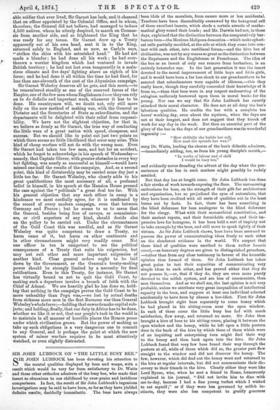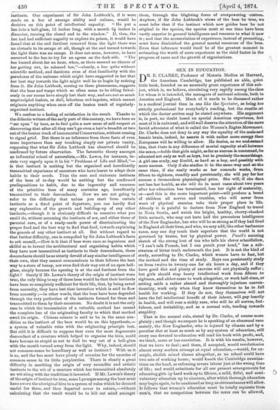SIR JOHN LUBBOCK ON "THE LITTLE BUSY BEE."
SIR JOHN LUBBOCK has been devoting his attention to the mental qualities displayed by bees and wasps, with a result which would be very far from satisfactory to Dr. Watts and those other orthodox admirers of the busy bee, who made that insect so obnoxious to our childhood by over-praise and invidious comparisons. In fact, the result of Sir John Lubbock's ingenious investigations may be said to have been, so far as they have yielded definite results, decidedly iconoclastic. The bees have always
been idols of the moralists, from causes more or less accidental. Teachers have been discreditably overawed by the hexagonal cell of these excellent insects, which sheds a certain aureole of mathe- matical glory round their heads ; and Mr. Darwin had not, in those days, explained that the distinction between the comparatively bar- barous bees—the Mexican Melipona domestica—which make spheri- cal cells partially moulded, at the side at which they come into con- tact with each other, into rectilineal forms,—and the hive bee of civilisation, was not by any means so great as the distinction between the Esquimaux and the Englishman or Frenchman. The idea of the bee as an insect of only one remove from barbarism, is an entirely heterodox one. In the last generation it was the insect devoted to the moral improvement of little boys and little girls, and it would have been a far less shock to our grandmothers to be assured that schoolmasters were capable of idleness,—this they really knew, though they carefully concealed their knowledge of it from us,—than that bees were in any respect undeserving of the eulogium uniformly bestowed upon them in moral books for the young. Nor can we say that Sir John Lubbock has exactly attacked their moral character. He does not at all deny the bee's laborious qualities. He credits the bee with a complete ten hours' working day, even about the equinox, when the days are not at their longest, and does not suggest that they knock off work for any day in the week. But then an essential part of the glory of the bee in the days of our grandmothers was its wonderful
ingenuity :- "How skilfully she builds her cell,
How neat she spreads her wax !"
sang Dr. Watts, leading the chorus of the bee's didactic admirers, —immediately adding, too, as from his young disciple's mouth,—
" In works of labour and of skill
I would be busy too,"
and evidently never dreading the advent of the day when the pre- eminence of the bee in such matters might possibly be rudely assailed.
But that day has at length come. Sir John Lubbock has done a fair stroke of work towards exposing the Bees. The unreasoning enthusiasm for bees, on the strength of their gift for architecture and organisation, has so prejudiced the eyes of naturalists, that they have been credited with all sorts of qualities not in the least borne out by facts. In fact, there has been something in the blind deference for bees analogous to the blind deference for the clergy. What with their monarchical constitution, and their ancient repute, and their formidable stings, and their im- pressive love for hexagons, it has been held a sort of impiety not to take example by the bees, and still more to speak lightly of their virtues. As Sir John Lubbock shows, bees have been assumed to possess the power of communicating ideas freely to each other on the slenderest evidence in the world. We suspect that these kind of qualities were ascribed to them rather honoris causa, —as honorary degrees are given to distinguished preachers, —rather than from any clear testimony in favour of the honorific opinion thus formed of them. Sir John Lubbock has taken great pains to test their capacities of communicating very simple ideas to each other, and has proved either that they do not possess it,—or, that if they do, they are even more purely devoted to the selfish system, and are less of communists, than men themselves. And as we shall see, the last opinion is not very probable, unless we attribute very great inequalities of intellectual capacity to the bees, and suppose at least one individual selected accidentally to have been by chance a bee-idiot. First Sir John Lubbock brought eight bees separately to some honey which he had placed in his sitting-room near the open window. In each of these cases the little busy bee fed with much satisfaction, flew away, and returned no more. Sir John then brought a hive of bees to his sitting-room, placing it between the open window and the honey, while he left open a little postern door in the back of the hive by which those of them which were of an inquiring and enterprising turn might find their way to the honey and then back again into the hive. Sir John Lubbock found that very few bees found their way through the postern at all, while of those which did so, the greater part flew straight to the window and did not discover the honey. The few, however, which did find out the honey went and returned to the hive at regular intervals, but did not communicate their dis- covery to their friends in the hive. Clearly either they were like Lord Byron, who, when he met a friend in Rome, humorously
explained in his journal, "Did not invite him to dine with me to-day, because I had a fine young turbot which I wished to eat myself ;" or if they were less governed by selfish in- stincts, they were also less competent to gratify generous instincts. One experiment of Sir John Lubbock's, if it were made on a bee of average ability and culture, would be decisive on this point of intellectual capacity. " He put a bee into a bell-glass, 18 inches long, with a mouth 6f inches in diameter, turning the closed end to the window." If, then, the bee bad had sufficient sagacity to explore its prison, it would have found that at the end furthest removed from the light there was no obstacle to its escape at all, though at the end turned towards
the light there was no escape. It does not seem, however, to have occurred to the bee to try for an egress on the dark side. "The bee buzzed about for an hour, when, as there seemed no chance of her getting out, he released her,"—clearly, a bee quite without scientific method, and destitute even of that familiarity with the paradoxes of the universe which might have suggested to her that her best way towards the light might well be to begin by retiring from it. Sir John Lubbock, musing on these phenomena, suggests that the bees and wasps which so often seem to be idling frivol- ously in our rooms have simply lost their way, and are not so much unprincipled loafers, as dull, laborious red-tapeists, which cannot originate anything when once off the beaten track of -regularly- organised instinct.
We confess to a feeling of satisfaction in the result. Thanks to the didactic writers of the early part of this century, we have been so "sat upon" by bees, as to feel quite a new sense of -self-respect at discovering that after all they can't go even a hair's-breadth or two out of the beaten track of immemorial Conservatism,without corning to signal grief. But there is an inference from these facts of even more importance than any touching simply our private vanity, supposing that what Sir John Lubbock has observed should be confirmed by future observation. The favourite theory amongst an influential school of naturalista,—Mr. Lewes, for instance, in- sists very eagerly upon it in his "Problems of Life and Mind,"— is that instinct is nothing but the organised and hereditarily transmitted experience of ancestors who have learnt to adapt their habits to their needs. Thus the sure and elaborate instincts of the bees of to-day would be nothing but the confirmed i predispositions to habit, due to the ingenuity and resource ' of the primitive bees of many centuries ago, hereditarily transmitted to their descendants. Now we are not going to refer to the difficulty that unless you start from certain instincts as a fixed point of departure, you can hardly find any explanation of the growth and building-up of any other instincts,—though it is obviously difficult to conceive what you could do, without assuming the instincts of sex, and either those of parental care, or of a ready-made power of discriminating the proper food and the best way to find that food, towards explaining the genesis of any other instinct at all. But without regard to that further difficulty, one is compelled by Sir John Lubbock's facts to ask oneself ,—How is it that if bees were once so ingenious and skilful as to invent the architectural and organising habits which they have now transmitted as instincts to their descendants, those descendants should be so utterly devoid of any similar intelligence of -their own, that they cannot communicate to their fellows the best way to a store of honey, nor even find their way out of an open bell- glass, simply because the opening is at the end furthest from the light ? Surely if Mr. Lewes's theory of the origin of instinct were true, the only thing to say of these bees would be that their instincts have been so completely sufficient for their life, that, by being saved from necessity, they have lost that invention which is said to flow from necessity ;—in other words, that the bees have been degraded through the very perfection of the instincts formed for them and transmitted to them by their ancestors. No doubt it is not the only case in which the transmission of a valuable method has caused the complete loss of the originating faculty to which that method owed its origin. Chinese science is said to be in the same con- dition as the instinct of the bees would be on this hypothesis,— a system of valuable rules with the originating principle lost. But still it is difficult to suppose that even the most degenerate descendant of a creature which helped to organise the hive, could have become so stupid as not to find its way out of a bell-glass with the mouth turned away from the light. Why, indeed, should not common-sense be hereditary as well as instinct ? With us it is so, and the bee must have plenty of occasion for the exercise of common-sense in its little perplexities. There is clearly a great -difficulty in ascribing the origin of very recondite and artistic instincts to the wit of a creature which has transmitted absolutely no wit along with the traditions it invented. If Mr. Lewes's theory of the origin of instinct be true, some Lycurgus among the bees must have sworn the aboriginal hive to a system of rules which he deemed -useful for them, and then departed never to return,—without calculating that the result would be to kill out mind amongst
them, through the blighting force of overpowering custom. Anyhow, if Sir John Lubbock's views of the bees be true, we must infer that if the instinct which now guides bees be not original in the species, the species must at one time have been vastly superior in general intelligence and resource to what it now is ; and that the accumulation of experience, instead of promoting, must have diminished the general mental resources of the bees. Even that inference would itself be of the greatest moment in estimating the worth of mere experience as the chief factor in the progress of races and the growth of organisations.



































 Previous page
Previous page